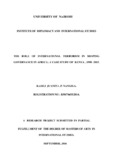| dc.contributor.author | Kasili, Juanita P N | |
| dc.date.accessioned | 2017-01-10T11:54:37Z | |
| dc.date.available | 2017-01-10T11:54:37Z | |
| dc.date.issued | 2016-09 | |
| dc.identifier.uri | http://hdl.handle.net/11295/100202 | |
| dc.description.abstract | Terrorism not only puts a state‟s national security in the political agenda but it also forces governments to make decisions that alter how a state is managed. This study demonstrates the role of international terrorism in shaping governance in Africa using the case study of Kenya between 1998 and 2015. The study has three specific objectives: to investigate the counter terror measures used by the government of Kenya; to investigate the impacts of the counter terror measures on the rule of law and human rights ,and to investigate the link between international terrorism and governance in Kenya. The realist theoratical framework asserts that governments are concerned with providing national security and for there to be order and national security, some human rights and freedoms have to be sacrificed. The theory was used to analyse Kenya‟s counter terror measures and their impacts on the rule of law and human rights. The researcher used purposive sampling to collect qualitative and quantitative data by interviewing a total of eighty respondents who included: security analysts, officials from the National Counter Terrorism Center, Police officers and Kenya defence forces officers who were resourceful in analysing Kenya‟s counter terror measures and their impacts on governance. Other respondents were county government officials and citizens from Nairobi, Lamu, Mandera, Garissa and Mombasa counties which have experienced a number of terror attacks as well as various counter terror security operations; hence were key informants on the impacts of government‟s counter terror measures on their human rights and the rule of law. The study established that Kenya‟s counter terror measures are informed by intelligence gathered; vulnerability to terror attacks and an endeavour to improve Kenya‟s counterterror strategy. The study established that some counter terror measures negate constitutionalism by perpetuating human rights and rule of law violations.The study observed that, in responding to terrorism the government of Kenya has formulated policies, enacted laws, made decisions and instituted practices that have inturn altered the social,economic and political norms in Kenya. The research findings affirm the hypotheses that Kenya‟s counter terror measures have not resulted into absence of terror attacks in Kenya, some counter terror measures used by the government violate human rights and constitutional provisions and international terrorism has impacted governance in Kenya both positively and negatively.The study recommends the use counter terror measures that promote constitutionalism by respecting the rule of law,human rights and freedoms. Secondly, terrorism provides an opportunity for the government to address historical grievances and injustices through social justice, truth justice and reconciliation mechanisms. | en_US |
| dc.language.iso | en | en_US |
| dc.publisher | University of Nairobi | en_US |
| dc.rights | Attribution-NonCommercial-NoDerivs 3.0 United States | * |
| dc.rights.uri | http://creativecommons.org/licenses/by-nc-nd/3.0/us/ | * |
| dc.subject | The Role Of International Terrorism In Shaping Governance In Africa | en_US |
| dc.title | The Role Of International Terrorism In Shaping Governance In Africa; A Case Study Of Kenya 1998 -2015. | en_US |
| dc.type | Thesis | en_US |
| dc.description.department | a
Department of Psychiatry, University of Nairobi, ; bDepartment of Mental Health, School of Medicine,
Moi University, Eldoret, Kenya | |


